| Interiors of Virginia Houses |
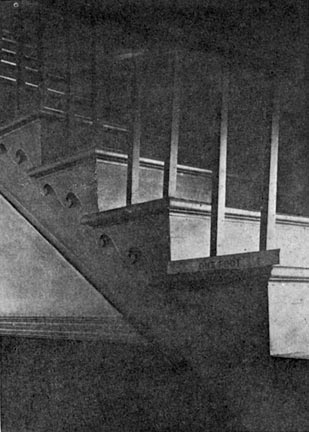
Detail of step ends showing a carved decoration of the Vitruvian scroll.
| The broad lawn, where graceful vase-shaped elms have supplanted more ancient trees and maples have been used for their quick growth in the place of dying paulonias, ends in a river walk thirty feet wide where great knots of boxwood, old shrubs and the over-lapping branches of trees not old, form a veritable pleached allée. Honeysuckle wraps with affection the bole of an ancient tree; ivy gives the age of locust trunks to which it clings and rose bushes, scattered first here, then there, make of the lawn a beautiful informal garden. It is said that once two lines of giant roses outlined the river walk and that from this the name of Rosegill was given to the place. But this sounds a bit too modern, for roses were not thought of as place names in Sixteen-forty nine. The name evidently recalled to Ralph Wormeley I, or to some of his descendants, one that was loved by him in another country. |
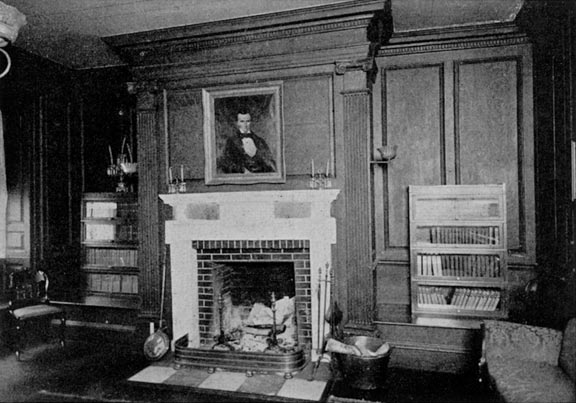
The panelled drawing room is notable for a superb cornice and Sienna marble mantel decoration.
| Ralph Wormeley II was a student at Oriel College, Oxford, in Sixteen-sixty five, and upon his return to Virginia became the most powerful man in the Colony. Although in appearance he was a modest country squire, a mighty fox hunter and connoisseur in horses, he was Secretary of State, Collector and Naval Officer of the Rappahannock River, President of the King's Council and a member of the House of Burgesses. His Inventory, dated Seventeen-one, shows the value of his library, one of the best in Virginia, then names of the rooms at Rosegill. "Parlour, chamber, chamber over saloon chamber, chamber over the parlour, nursery, old nursery, room over the Ladyes Chamber, Entry." The Inventory speaks of the "Home House" to which were attached eight English servants, among them a shoemaker, a tailor and a miller. Ralph II left a personal estate valued at three thousand pounds. |
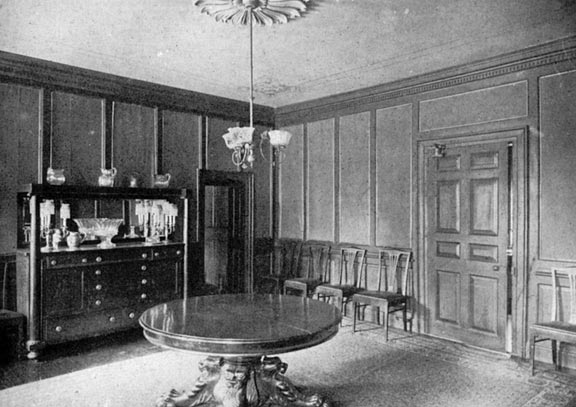
The dining room follows the design of the parlour in its panelling.
| Here the Wormeleys lived in princely splendour on their plantation, their house filled with a fortune in silver plate and china and cut glass which was constantly in use, in the hospitable domicile. This happy Colonial life continued until it was rudely interrupted by the Revolution, for Ralph Wormeley V was one of the last members of the Royal Council in Virginia. While he did not leave America, he was a staunch Royalist and became obnoxious to the new spirit of Virginia. He was so careless as to what he said or wrote that the Colonial government banished him to his father's shooting box in Berkeley County under bond for ten thousand pounds for good behaviour. He lived, however, to outgrow his love for the English Court and to become a member of the General Assembly of the new Virginia. After his death in Eighteen-six his plantation was sold and one of the most picturesque régimés of the Colonial era came quietly to an end. The reign of the Wormeley family at Rosegill lacked but twenty-three years of having existed through the entire Colonial period. They also were for another quarter of a century brave in their allegiance to the new Republic -- a record second to none in America. |
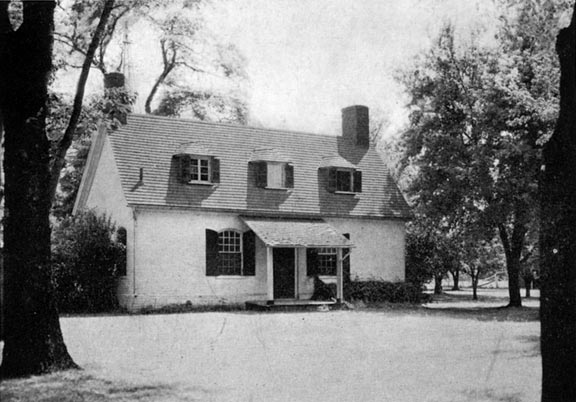
The river front of the original kitchen which duplicates the school house now used as a diary.
| In connection with subsequent ownerships, there is a pretty story tinged with pathos regarding the struggles of Captain Bailey who lived at Rosegill for some years. As an orphan had, with no home but the great wide world, he sought fortune from this same wide world, and his career began on merchant vessels. Born in Lancaster County, every time he returned from a voyage he cast envious glances at Rosegill, declaring that if his life were spared he would spend his last dollar to get possession of that famous house. He visited many countries and sailed over all the seas; he was shipwrecked but stood the hardship manfully, declaring to those with him that he would be saved to become the master of Rosegill. He stood any and everything with the hope of winning the fortune necessary to give him the wonderful plantation. At last his fortune was gathered; he had money that would bring Ralph Wormeley's homestead into his possession, and at the first opportunity, almost like a fairy tale, the estate was his to command and his boyhood dream had come true. |
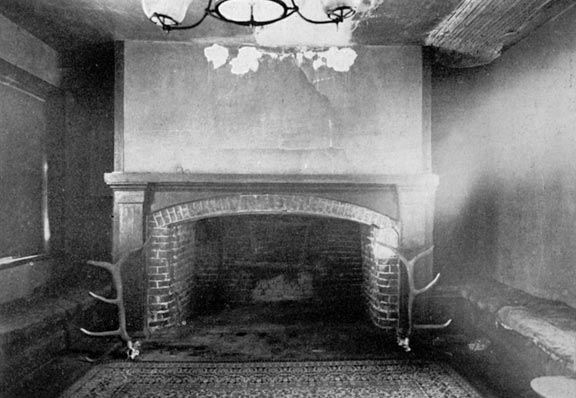
The interior of the kitchen whose arched fireplane opening has a width of fifteen feet.
|
Captain Bailey is said to have removed some parts of the dwelling and changed others, but unfortunately there is no authentic record of the changes made by him. He loved the place as he did few other things and the fact of possessing it, instead of lessening its value, made Rosegill all the more worthwhile to him. The same lavish hospitality was dispensed by him as by the founders. In Nineteen-one the estate, which had lost many acres with the passing of years, was bought by Senator J. H. Cochran, from whom, a few years ago, it became the property of Mr. and Mrs. Norwood Browning Smith. The house, the lawn, the outbuildings and waving grain fields are in beautiful condition. Throughout its many years the old homestead has been happy, not feeling the pangs acutely suffered by so many of Virginia's Colonial estates. The golden age of Rosegill was, however, in the days of Ralph Wormeley II, who was considered the "most powerful man in the Colonies." Cultured -- witty -- capable -- a man of great learning, fashioned in the friendship of the highest English nobility, with boundless wealth and a vast acreage of land, he was a Cavalier among the many notable Cavaliers of his country. |
|
|